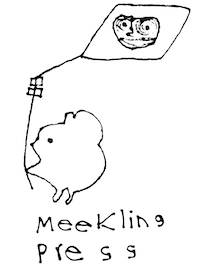If nothing else we Meeklings believe in Wittgenstein and his Tractatus Logico-Philosophicus, and the way it articulates so clearly an idea we summoned when making The Meekling Review: “The limit can, therefore, only be drawn in language and what lies on the other side of the limit will be simply nonsense.’ What is that limit? How far can we overshoot? We grasped towards it with words and searched for it in work that bathed us in so much nonsense we couldn’t help but make sense of it. We had our contributors cloak themselves in false identities, too.
Nijinsky’s Head, better known as Kyle Coma-Thompson is the author of ‘Mutiny in Heaven,’ a poem whose narrator insists on the performance of other selves, one of whom is possibly Njininsky: “Truth is, I am someone else alive in the leap,” he says. We published an excerpt from Kyle’s poem earlier this week. In today’s Q&A we asked him some questions about the poem:
What inspired “Mutiny in Heaven”?
Over a span of six and a half weeks, while living in Switzerland at the beginning of WWI, Nijinsky writes his diaries. Thirty-one years later, he dies, having spent half his life in what can only be called “poor mental health.” Thirty-three years later, the Australian group The Birthday Party makes their last recording, the Mutiny! EP. The last song on that recording is a hilarious ear-orgy of gored, grotesque sound, titled a bit cheekily “Mutiny In Heaven”. Thirty years after that some quiet American sits down to listen to the Mutiny! EP while simultaneously leafing through Nijinsky’s diaries and finds himself duly humbled and moved by the poignancy and ferocity of last works. So to commemorate the occasion, he writes a poem.
The events of the past week(s)—including the commander in chief’s telling the FEMA chief that he’d become “ very famous” as a result of Hurricane Harvey, and his excuse of timing Joe Arpaio’s pardon to ‘maximize’ ratings—are a hollow echo of “Mutiny in Heaven”’s observations regarding power and authority and celebrity. Is our narrator Nijinsky prophetic? Chronology says he precedes our times and yet he’s a keen reader of them….
Nijinsky was Russian and a celebrity in his time. So you could say he was acquainted with the worst aspects of human nature, by design. But then, he was able to render such beautiful movements with something so small and fragile as the human body. So his vision of the contradictions of our current moment, you could say, was comprehensive, and total.
With regard to identity: I came away from recently reading Catherine Lacey’s The Answers, thinking of the narrator’s claim that “Love is a compromise for only getting to be one person,” I liked the sound of this, but then when confronting the narrator of “Mutiny in Heaven”, he refutes this idea of only having to be one person, stating, “Truth is I am someone else, alive in the leap.” I like the sound of this too. If identity is shifting, how does the narrator perform this, and what is the price for getting to be many people?
Maybe best to say: having to be one body is the price we pay for getting to be many people. And that that’s a paradox that leads so many of us into so much trouble.
I would say, being the narrator of a poem titled “Mutiny in Heaven” instead of a novel titled The Answers, it seems to me many hope that love will do the opposite—keep them still, in place, stable, only one person. Being multiple is a restless confusion; so maybe it’d be safer to be only one thing to one person—if that’s love. Which, of course, it isn’t. Not the kind that lasts. But then, this is only one version of me that’s saying this. There’re others in here who’d say different. And so it goes, the comedy of the human condition—outrageous, subtle, relentless.
What do you think of this Nijinsky’s head, Nijinsky’s Head? (below, by Auguste Rodin) Why not cast your feet? What is most overlooked with regard to Nijinsky? And what does he overlook himself?
Dancing begins in the mind, so it only makes sense A. Rodin would sculpt my head. My feet are in my mind…so you have to look me in the face if you want to appreciate them—while they’re in movement, while I’m thinking them.
What’s most overlooked? The thirty years I spent in exile at the end of my life, away from what everyone expected of me. I feel like poor Robert Walser. Only long after I’m gone do comfortable people feel moved to take up my name and speak of me as if I were always alongside them—instead of beneath them, for a very, very long time. God help them. And me too.

Nijinsky’s Head was born on Apr. 8th 1950 in London, England. It has been rolling towards you ever since, and will continue to do so long after you’re gone.
Kyle Coma-Thompson is the author of short story collections The Lucky Body (Dock Street Press, 2014) and Night in the Sun (Dock Street Press, 2016). The title story for this book was included by Ben Marcus in the anthology New American Stories (Vintage, 2015)
get your own damn copy!?






